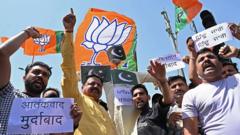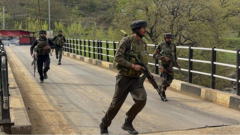On January 1, 2025, a terrorist attack in New Orleans resulted in 14 casualties. The assailant's connection to ISIS raises discussions on modern radicalization tactics.
New Year’s Day Tragedy: ISIS-Inspired Attack in New Orleans

New Year’s Day Tragedy: ISIS-Inspired Attack in New Orleans
A deadly vehicle ramming incident highlights ongoing concerns about ISIS radicalization.
The Islamic State may have lost significant territorial control, yet its influence remains pervasive, as demonstrated by a shocking incident in New Orleans on New Year’s Day. A man, identified as Shamsud-Din Bahar Jabbar, drove his vehicle into a crowded area, claiming the lives of 14 individuals while waving an Islamic State flag. Though authorities have yet to establish direct affiliations between Jabbar and ISIS, the F.B.I. confirmed that his actions were deeply inspired by the terrorist group.
Experts are now examining the role of online content in promoting such radicalization. Authorities found no specific evidence of Jabbar’s engagement with ISIS operatives; however, the flag placement on his truck closely mirrored an ISIS campaign promoting vehicular assaults against civilians. Preceding the attack, Jabbar shared several videos on his Facebook account declaring his allegiance to the group.
The sophisticated media strategies of ISIS contribute significantly to its enduring global influence. From online propaganda videos to a weekly newsletter, the terrorist organization effectively communicates its extremist messages to potential followers worldwide. Terrorism expert Hans-Jakob Schindler emphasized that ISIS’s communications tactics outpace its military capabilities, making cyber engagement a crucial tool for the group.
The case of Jabbar serves as a grim reminder of how the Islamic State’s modern methods can result in tragic real-world violence. As experts continue to analyze the radicalization environment, the need for vigilance in countering extremist propaganda remains critical in safeguarding communities against terrorist threats.
Experts are now examining the role of online content in promoting such radicalization. Authorities found no specific evidence of Jabbar’s engagement with ISIS operatives; however, the flag placement on his truck closely mirrored an ISIS campaign promoting vehicular assaults against civilians. Preceding the attack, Jabbar shared several videos on his Facebook account declaring his allegiance to the group.
The sophisticated media strategies of ISIS contribute significantly to its enduring global influence. From online propaganda videos to a weekly newsletter, the terrorist organization effectively communicates its extremist messages to potential followers worldwide. Terrorism expert Hans-Jakob Schindler emphasized that ISIS’s communications tactics outpace its military capabilities, making cyber engagement a crucial tool for the group.
The case of Jabbar serves as a grim reminder of how the Islamic State’s modern methods can result in tragic real-world violence. As experts continue to analyze the radicalization environment, the need for vigilance in countering extremist propaganda remains critical in safeguarding communities against terrorist threats.




















